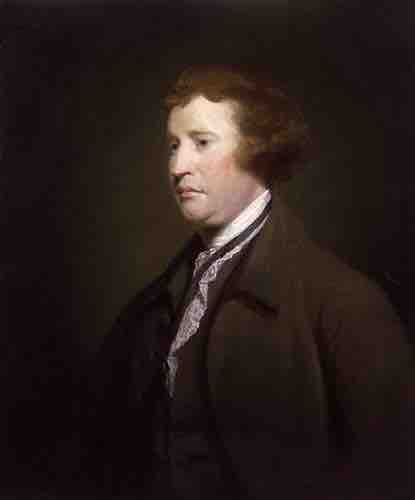Conservatism, taken from the Latin word conservare ("to retain") is a political and social philosophy that promotes retaining traditional social institutions. Edmund Burke, an Anglo-Irish politician who served in the British House of Commons and opposed the French Revolution , is credited as one of the founders of conservatism in Great Britain and is generally viewed as the philosophical founder of modern conservatism.

Edmund Burke
Edmund Burke, considered to be the philosophical founder of modern conservatism.
Variants of Conservatism
Liberal conservatism is a variant of conservatism that combines conservative values and policies with classical liberal stances. Historically, the term referred to combination of economic liberalism, which champions laissez-faire markets, with the classical conservatism concern for established tradition, respect for authority, and religious values. It contrasted itself with classical liberalism, which supported freedom for the individual in both the economic and social spheres.
Libertarian conservatism describes certain political ideologies within the United States and Canada which combine libertarian economic issues with aspects of conservatism. Libertarian conservatives generally support strict laissez-faire policies such as free trade and oppose any national bank, regulations on businesses, environmental regulation, corporate subsidies, and other areas of economic intervention.
Fiscal conservatism is the economic philosophy of prudence in government spending and debt. Edmund Burke, in particular, argued that a government does not have the right to run up large debts and then throw the burden on the taxpayer.
National conservatism concentrates more on national interests than standard conservatism, and it upholds cultural and ethnic identity. It is heavily oriented towards the traditional family and social stability, and it is in favour of limiting immigration. As such, national conservatives can be distinguished from economic conservatives, for whom free market economic policies, deregulation, and fiscal conservatism are the main priorities.
Cultural conservativism the preservation of the heritage of one nation, or of a shared culture that is not defined by national boundaries.Cultural conservatives hold fast to traditional ways of thinking even in the face of monumental change. They believe strongly in traditional values and politics, and often have an urgent sense of nationalism.
Social conservatism is distinct from cultural conservatism, although there are some overlaps. Social conservatives believe that the government has a role in encouraging or enforcing what they consider traditional values or behaviors. A social conservative wants to preserve traditional morality and social mores, often through civil law or regulation. Social change is generally regarded as suspect.
Religious conservatives principally seek to apply the teachings of particular religions to politics, sometimes by merely proclaiming the value of those teachings, and at other times by having those teachings influence laws.
Conservatism in the United States
The meaning of "conservatism" in America has little in common with the way the word is used elsewhere, since what most Americans consider conservatism is what much of the world considers liberalism or neoliberalism. Since the 1950s conservatism in the United States has been chiefly associated with the Republican Party. Major movements within American conservatism include support for tradition, law-and-order, Christianity, anti-communism, and a defense of "Western civilization from the challenges of modernist culture and totalitarian governments. " Economic conservatives and libertarians favor small government, low taxes, limited regulation, and free enterprise. Social conservatives see traditional social values as threatened by secularism, so they support school prayer and oppose abortion and homosexuality. Neoconservatives want to expand American ideals throughout the world and show a strong support for Israel. Paleoconservatives, in opposition to multiculturalism, press for restrictions on immigration.